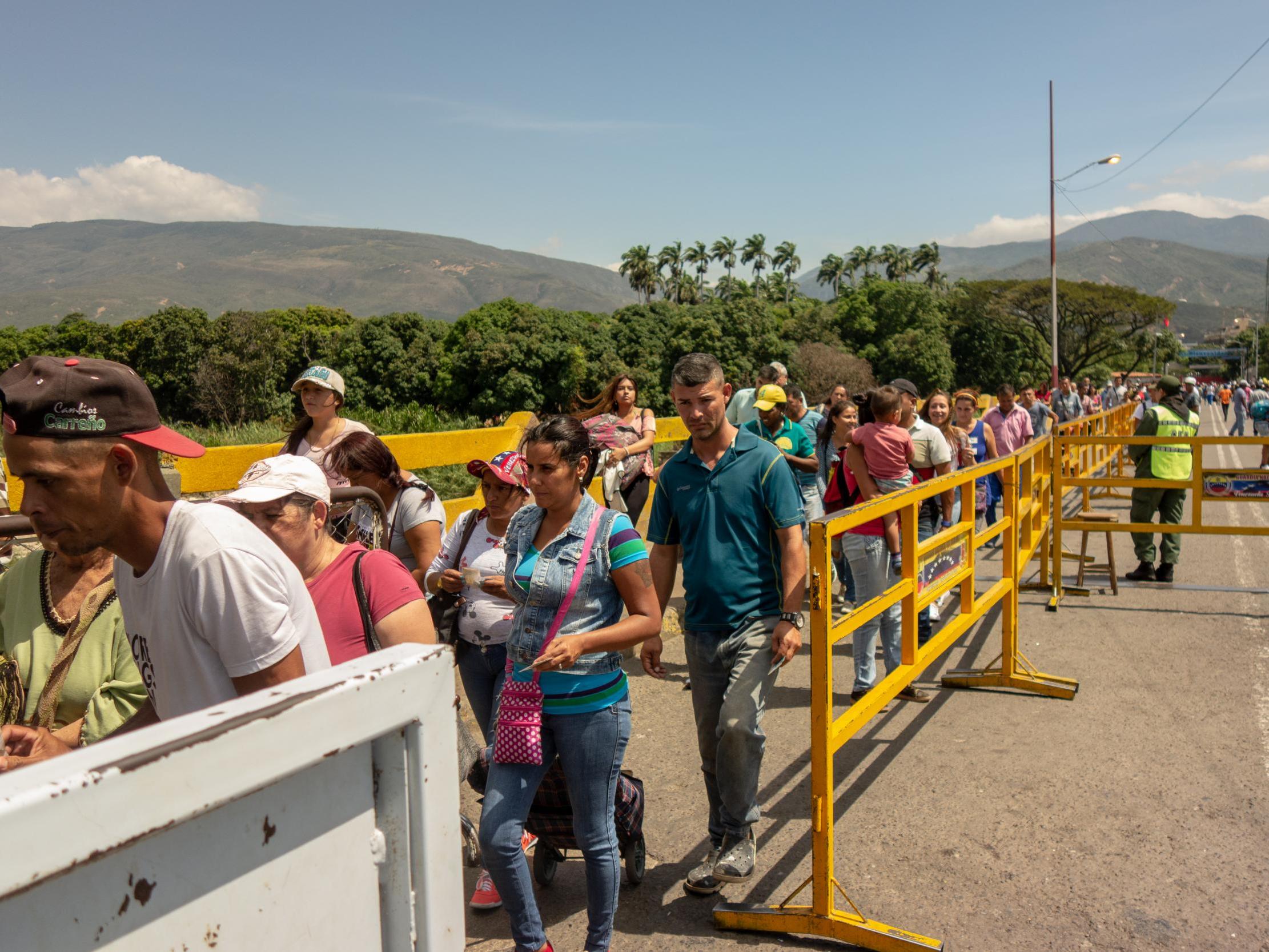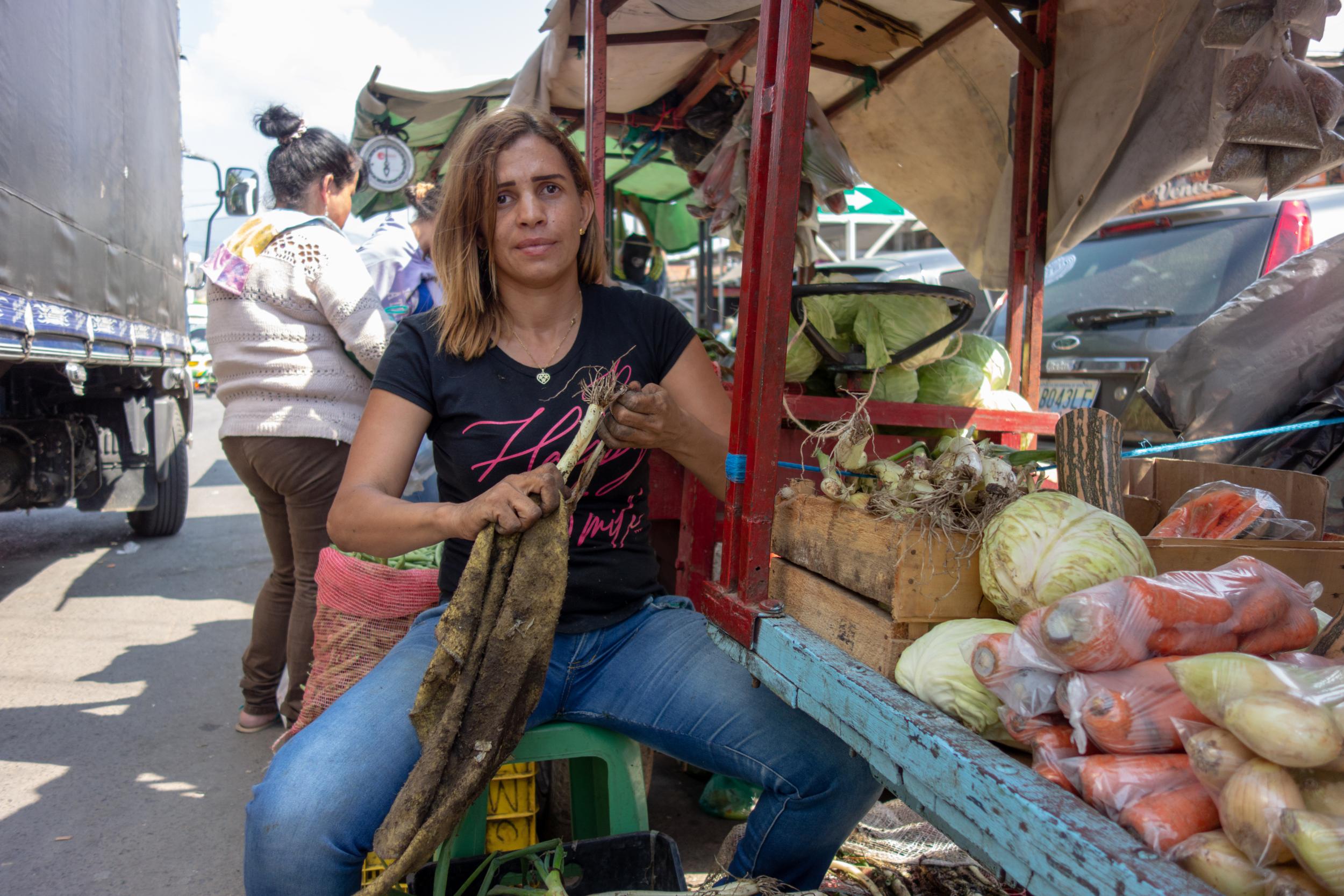On the Colombian border, Venezuelans flee unrest and poverty at home: ‘Children are going hungry’
But many feel new sense of optimism with rise of ‘interim president’ Juan Guaido

On the Simon Bolivar Bridge, where Venezuela meets Colombia, crowds are forming. A constant flow of people stream west, bodies lumbering under the weight of sacks of flour and piles of toilet roll.
This is the principal crossing between Tachira in western Venezuela and Cucuta in eastern Colombia for the growing number of people fleeing the ongoing economic and political crisis.
Some 3 million have now fled since the crisis began four years ago, and each day an estimated 5,000 more leave, according to the UN, as the country’s descent into economic catastrophe worsens.
Border officials estimate another 1,600 a day have no documentation and take illegal crossings where armed gangs operate. Some are forced to sell their hair or bodies to eat.
Waiting for a bus to take him to the city of Medellin, Colombia, 36-year-old Jose Luis is one of many with stuffed suitcases taking shelter from the midday sun in the little shade he can find.
“You can’t work, and when you find work the salary will not buy you anything,” he says of his homeland, raising his voice to be audible over hawkers hustling to sell bus tickets to migrants.
“Children are not studying and are going hungry while their parents have to abandon them to try and send home money … I don’t see a solution.”
But since mass protests filled streets across Venezuela on 23 January, and Juan Guaido, head of the national congress, swore himself in as interim president, hope has started to grow for many fleeing unliveable conditions there. Some feel change is imminent.
“As soon as we have another protest you will see double or triple as many people on the streets because now we don’t have fear, now we have a new hope,” says Victor Pena, 50, who is buying bags full of basic food items – flour, rice and pasta – often unavailable across the border. “Juan Guaido has given us hope, and the opposition strength.”
Alongside the disputed president Nicolas Maduro’s human rights abuses and increasingly authoritarian approach to governing the nation, there is widespread discontent stemming from a belief that mismanagement has led to the oil-rich country facing rampant food and medicine shortages while hyperinflation has rendered the currency almost worthless.
But although many Venezuelans want to see a quick end to Maduro’s regime, there are growing concerns that conflict could be brewing.
Protests are increasingly common and are met with a heavy response; the latest wave of protests resulted in 35 deaths and 850 arrests, according to the Venezuelan NGOs.

Marielis Palencia, 32, has left her young children in Venezuela with her mother while she sells fruits and vegetables from a cart at the border in order to send them money. She currently makes enough to send $15 home a week, but not long ago was sleeping under a bridge.
“Everyone wants to get rid of Maduro, even those that supported him,” she says, scraping the dirt from a stick of celery. “But I cannot see war and death, as in so many other countries, it would be too much to bear.”
“We are already dying of hunger and there is no water. Imagine it with war or military intervention,” adds her partner, Carlos Tobal.
Many feel that the current tensions between the regime, the opposition and the Venezuelan people could soon bubble over.
“There is already violence, we are at a critical point which could lead to a coup d’etat or civil war,” says 55-year-old Jose Alviarez, sitting on the edge of a local football pitch, a popular rest spot for Venezuelans who have just crossed the border.
“The people are the ones who will have to pay the consequences – you can already see that with the disintegration of homes [during the crisis].”
More concerning still is the prospect of military intervention, seen as an increasingly likely possibility after US national security adviser John Bolton was photographed with a notebook suggesting 5,000 US troops could be sent to Colombia, the US’s biggest Latin American ally and a vocal Maduro opponent.
A few welcome the “gringos”, but most are quick to protest against unnecessary bloodshed.
“I pray to god there is not intervention, wherever there is intervention there is destruction,” says Elizabeth Quijano who travels regularly to Cucuta to buy medicine, to treat hypertension and a failing kidney, otherwise unavailable in Venezuela.
“The United States does not want to help us because it wants to help us, it wants to help us because of our riches: we have coltan, we have precious stones, and oil.”
For now, all eyes are on the latest news coming out of the Andean nation. It remains to be seen whether top courts will pursue Guaido and his opposition, or if cracks really are forming in the military’s allegiance to President Maduro.
“It is hard to tell what is happening. All I know is I want to go home,” Jose Luis says.
Join our commenting forum
Join thought-provoking conversations, follow other Independent readers and see their replies
Comments